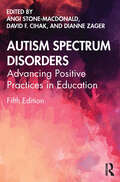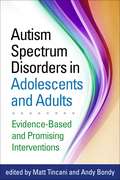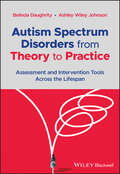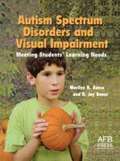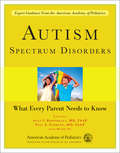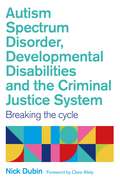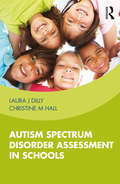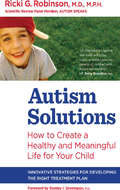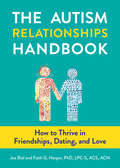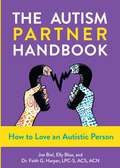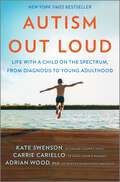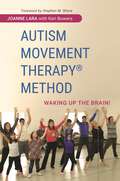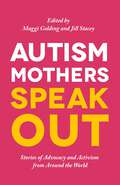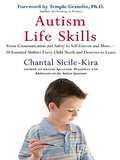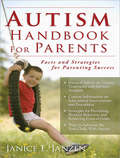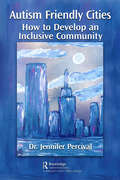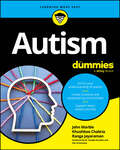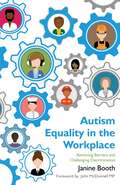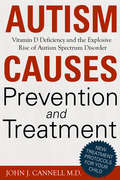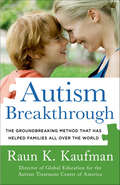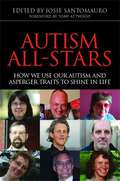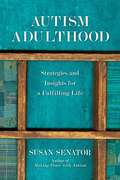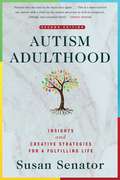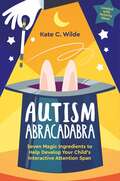- Table View
- List View
Autism Spectrum Disorders: Advancing Positive Practices in Education
by David F. Cihak Dianne Zager Angi Stone-MacDonaldThe fifth edition of Autism Spectrum Disorders: Advancing Positive Practices in Education provides readers with a comprehensive and accessible understanding of current research and evidence-based practices in autism spectrum disorders (ASD), linking research, theory, and practice. This new edition includes new chapters on trauma and co-morbidity, current trends in autism research, social media, neurodiversity, and aging in people with ASD. It also features updated content on international contexts and culturally sustaining and relevant practices. Aligned with DSM-5 diagnostic criteria, this text continues to be critical reading for students and researchers in special and inclusive education programs.
Autism Spectrum Disorders in Adolescents and Adults
by Matt Tincani Andy BondyBringing together leading experts, this book presents effective practices for helping people with autism spectrum disorders (ASD) to thrive in adulthood. As individuals with ASD mature, their needs change as well. The book reviews the growing research base and describes ways to support adolescents and adults in succeeding in higher education and work, living independently, enjoying leisure activities, navigating meaningful personal relationships, and more. Specific behavioral and instructional interventions--such as functional communication training, positive behavior support, and applied behavior analysis--are discussed. Case examples illustrate practical aspects of applying the strategies in real-world school and community settings.
Autism Spectrum Disorders from Theory to Practice: Assessment and Intervention Tools Across the Lifespan
by Ashley Wiley Johnson Belinda DaughrityAutism Spectrum Disorders from Theory to Practice Apply the latest ASD theory to assessment and intervention in real-world clinical environments In Autism Spectrum Disorders from Theory to Practice, a team of experienced interventionists deliver a practical application of modern theory regarding autism spectrum disorders (ASDs) to common, real-world clinical situations. Hands-on guidance is paired with advice on culturally appropriate and responsive practices informed by professionals who collectively have over 40 years of combined speech pathology experience. The work of special contributors like Dr. Pamela Wiley, who is the Founder and President of the Los Angeles Speech and Language Therapy Center, appears alongside evidence-based ASD intervention instruction that draws from the latest studies and from the authors’ assessments and interventions with clients from a diverse range of backgrounds. When combined with the reader’s own professional competence, clinical experiences, and continuing education, this book is a powerful resource that will improve patient outcomes. Autism Spectrum Disorders readers will also find: Personal anecdotes from the authors’ clinical practices to help illustrate the application of the concepts discussed within Active Learning Tasks that educators can use to promote learning activities that encourage direct engagement with the material Helpful and illustrative diagrams included throughout the text to help elucidate points and clarify information in each chapter Goal Spotlights that provide sample intervention goals practitioners can use with actual clients with autism Reflection Letters in which individuals from various perspectives and backgrounds—from autism researchers to developmental psychologists, advocates such as Holly Robinson Peete, and adults thriving with autism—describe their experiences Autism Spectrum Disorders from Theory to Practice is a useful reference for new and experienced practitioners in the field of autism research, speech-language pathologists, developmental psychologists, adapted physical education teachers, professors, and those affected by ASD in their everyday life.
Autism Spectrum Disorders and Visual Impairments: Meeting Students' Learning Needs
by Marilyn H. Gense D. Jay GenseThis resource for educators describes some of the complex and varied effects on learning and behavior that result when a child with autism or a related disorder is also visually impaired. Two experienced special education practitioners outline core principles for designing effective instructional programs that meet the particular needs of these students. They also describe strategies for conducting assessments, encouraging social development, handling challenging behaviors, and helping students explore career possibilities. Annotation ©2005 Book News, Inc. , Portland, OR (booknews. com)
Autism Spectrum Disorders
by Paul S. Carbone Alan I. RosenblattAutism Spectrum Disorders: What Every Parent Needs to Know is an invaluable resource for parents and caregivers of children who have been diagnosed with an autism spectrum disorder (ASD). Prepared under the editorial direction of 2 distinguished pediatricians who are autism experts-one of whom is also the parent of a son with autism-this book helps you understand how ASDs are defined and diagnosed and provides you with information on the most current types of behavioral and developmental therapies. It also helps parents understand what they can do to help promote a smooth transition from adolescence through the teen years and into adulthood.Topics include Symptoms, frequency, and types of ASDs Accessing care Services in the community Tapping into educational resources Behavioral and developmental treatment The role of complementary and alternative medicine Screening tools Adolescence and beyondYou'll also find inspirational and supportive stories from other parents that will help you recognize that you're not alone on this journey. Autism Spectrum Disorders: What Every Parent Needs to Know provides you with tools to help navigate the sometimes challenging world of autism spectrum disorders.
Autism Spectrum Disorder, Developmental Disabilities, and the Criminal Justice System: Breaking the Cycle
by Nick DubinFor autistic people who find themselves facing a criminal charge, understanding how the features of autism may have contributed to their behaviour can be vital context for their defence. In this insightful book, Nick Dubin explores how and why autistic people get caught up in the criminal justice system. He delves into what steps can be taken to prevent autistic people committing crimes and what should be done to ensure their fair and appropriate treatment if they are charged with a crime. It covers everything from prevention to the aftermath of sentencing, including available counselling and therapy. Nick's personal experience and meticulous research shows that criminal justice can be an oppressive system that misunderstands and stigmatizes autistic people, especially low-risk individuals and those with less criminal responsibility.
Autism Spectrum Disorder Assessment in Schools
by Christine Hall Laura DillyAutism Spectrum Disorder Assessment in Schools serves as a guide on how to assess children for autism spectrum disorders (ASD), specifically in school settings. Dilly and Hall offer a general overview of ASD, describe ASD assessment best practices, and explain the process of identifying ASD in schools. Current research and up-to-date science is incorporated in a practitioner-friendly manner, and short case vignettes will increase the accessibility of the book content and illustrate principles. As the rates of ASD reach 1/59 children, and school psychologists are increasingly expected to possess expertise in the assessment of ASD, this book serves as a must have for school psychologists, school social workers, and other practitioners.
Autism Solutions
by Ricki G. RobinsonFor twenty years Dr. Ricki Robinson has been providing hope and help for children with Autism Spectrum Disorders. Her integrative, strengths-based approach to treatment includes a thorough evaluation of your child's medical, developmental, social, emotional, behavioral and educational issues to find the solutions that maximize your child's health and well-being.Autism Solutions gives parents a greater understanding of their child's unique learning, sensory and medical profile. Recognizing that no parent can do this alone, Dr. Robinson explains how to establish a team of professionals who can work with the child to give him or her the opportunity to live well, learn, interact and thrive.Autism Solutions covers a wide range of issues, including:* Helping your child relate, communicate and think* Recognizing and overcoming common health challenges* Effectively treating diseases and disorders that frequently accompany autism* Understanding how behavior can be a form of communication and how to "hear" what a child is telling you* Unlocking your child's full potential
Autism Relationships Handbook, The: How to Thrive in Friendships, Dating, and Love
by Joe Biel Faith G. Harper, PhD, LPC-S, ACS, ACNEver since he came out as autistic, people have been contacting Joe to share their stories and ask questions. The most common question by far: how do I find a romantic partner?Dr. Faith G. Harper, author of Unfuck Your Brain and Unfuck Your Intimacy joins autistic publisher and author Joe Biel to offer hard-won guidance on a wide range of topics about friendships, dating, and romance and answer a ton of questions. What do you want out of a relationship? What is the difference between flirting and harassment? How do you have a fun date and get to know someone when eye contact and prolonged conversation aren't your strengths? How do you change a casual acquaintance into friendship or dating? How do you express your needs and make sure you're hearing your partner when they express theirs? How do you maintain a healthy, happy long term relationship? Autistic readers will find valuable answers and perspectives in this book, whether you're just getting ready to jump into dating, seeking to forge closer friendships, or looking to improve your existing partnership or marriage.
Autism Partner Handbook, The: How to Love an Autistic Person
by Joe Biel Elly Blue Dr Faith G. HarperSo, your partner is autistic. Or you suspect they might be. And you're wondering, "What does this mean for my relationship?" This guide is for you. Learn key communication skills for succeeding in a neurologically mixed relationship, gain a better understanding of your partner's mental processes, troubleshoot your sex life, and level up your appreciation for your partner's relationship strengths. Autistic-allistic relationships, as well as relationships between two neurodivergent people, can work out splendidly, but there are a few consistent and predictable areas where they can get in trouble, which you can work through together once you know how to spot them. Dr. Faith G. Harper, author of Unf*ck Your Brain and Unf*ck Your Intimacy, joins Joe Biel (an autistic publisher and author) and Elly Blue (a partner of an autistic person), to offer hard-won guidance on a wide range of relationship topics.
Autism Out Loud: Life with a Child on the Spectrum, from Diagnosis to Young Adulthood
by Adrian Wood Carrie Cariello Kate SwensonAN INSTANT NEW YORK TIMES BESTSELLER!In this moving narrative of resilience and pure love, three mothers share their experiences and learnings about life alongside autism -- From the creators of Finding Cooper's Voice, What Color is Monday?, and Tales of an Educated DebutanteKate Swenson, Adrian Wood and Carrie Cariello are from different parts of the country and backgrounds, but they were brought together by a singular experience: they are each a mother to a child with autism. Together they have shared laughter, tears, victories and the unconditional love that molds their lives.Kate, Adrian and Carrie have children with very different autism profiles, and in Autism Out Loud they write about their unique experiences on a variety of topics, from diagnosis to caregiving, schooling and aging. Through their varied stories and lessons they&’ve learned, these incredible women provide a glimpse of what to expect on the autism journey and show parents that they are not alone. Written with honesty and heart, the stories within these pages serve as a reminder that even amid the storms of life, there is always hope and beauty to be found. A tribute to the unparalleled love of mothers, this inspiring book illuminates the joys, challenges and everyday miracles of life on the spectrum.
Autism Movement Therapy (R) Method: Waking up the Brain!
by Stephen M. Shore Keri Bowers Joanne LaraA practical guide to the innovative Autism Movement Therapy ® (AMT) approach - structured movement and music classes designed to stimulate the brain, aid sensory processing and decrease problem behaviours in children with autism spectrum disorders. Reflecting a growing interest in the body-brain connection, and incorporating the principles of Applied Behavior Analysis, the AMT approach uses music and movement to develop audio, visual, gross motor and spatial awareness skills in children with autism. The book breaks down the components of the typical 45 minute session, from circle games to story dances, and explains how the reader can create their own AMT program. This exciting new approach will complement other therapeutic techniques for children on the autism spectrum and can be used by a wide range of professionals, such as teachers, arts therapists and dance instructors, as well as parents and carers.
Autism Mothers Speak Out: Stories of Advocacy and Activism from Around the World
by Liz Lawrence Stephanie Lord Shubhangi Vaidya Margaret Golding Jill Stacey Carole Kevan Edith Betty Morales Irene Anne Constantinou Isabel Bayonas Jackie Ceonzo Joan Curtis Mary Moeketsi Merry Barua Petra Dillmann Samira Al-Saad Thando MakapelaRaising an autistic child comes with its own unique set of challenges, not least of which is dealing with the constant scrutiny of your parenting. This collection of stories from all corners of the globe celebrates the love, commitment and heroism of mothers of autistic people. These intimate accounts reveal both the differences in cultural attitudes, and the universality of the autism experience. Mothers from different cultural and socio-economic backgrounds speak out about the highs and lows of raising autistic children, and the shift in attitudes to autism as they watch their children enter adult life. Putting to bed the belief that autism is a result of poor parenting, this book not only lets parents know they are part of a supportive global community, it also highlights the positive aspects of autism and champions neurodiversity.
Autism Life Skills
by Sicile-Kira ChantalParents who have just received a diagnosis for their child are often shell-shocked. Autism Life Skills offers comprehensive advice for parents and 'coaches' them on how to work through the emotions inherent to having a child who is not developing as expected. It also addresses the practical issues that must be considered when raising a child with special needs, such as safety at home and earning a living, and teaches parents how to give their children the skills they will need for a healthy, happy life. Through empowerment strategies, Autism Life Skills offers support for parents new to autism and shows them how to: - Communicate with their child and each other - Address the issue of self-esteem - Develop social relationships for their child - Foster independence in your child
Autism Handbook for Parents: Facts and Strategies for Parenting Success
by Janice E. JanzenThe concise, authoritative guide for parents new to the subject of autism. Autism Handbook for Parents: Facts and Strategies for Parenting Success is written specifically for parents of children recently diagnosed with autism. Although it is a relief to know there is a name for their child's problems, many parents are unsure what steps to take after a child is diagnosed with autism. This book offers concrete answers to parents' questions and concerns. Clear and concise information on autism is provided, including how autism can affect learning and behavior. Parents will receive the information needed to help them advocate for their child and make decisions on various treatments and educational interventions. The author also includes advice on preventing many behavioral problems, dealing with those that do occur, and teaching early skills that are critical to a child's success. Autism Handbook for Parents is a must-have for those looking to be an effective advocate, teacher, and parent of their child with autism.
Autism Friendly Cities: How to Develop an Inclusive Community
by Jennifer PercivalAccess. Inclusion. Diversity. All people deserve to be embraced by their community. Autism Friendly Cities: How to Create an Inclusive Community is the first book designed to guide city leadership and staff through the process of evaluation, training, implementation, and developing an Autism Friendly initiative that will help you open your doors to everyone. People with autism should be able to participate in all that is offered and facilitated by their city, including services, activities, events, and points of connection. Being an Autism Friendly City is not only socially responsible, but will improve engagement, outreach, economic development, and resident satisfaction.
Autism For Dummies
by John Marble Khushboo Chabria Ranga JayaramanEmbrace neurodiversity and foster understanding Autism For Dummies is a comprehensive guide exploring the full spectrum of autism experiences. This essential resource deepens understanding for self-advocates, parents, educators, and professionals, fostering respect and acceptance for all individuals on the autism spectrum. Covering the basics of autism, including the latest research and diagnostic criteria, the book offers insights into neurological diversity. It acknowledges the vastly different abilities and support needs among autistic individuals, portraying these experiences with depth and empathy. The book addresses families' and caregivers' experiences, offering candid testimonials and practical advice on advocating for resources, fostering supportive communities, and ensuring the best outcomes for their children. Autism For Dummies bridges polarized views within the autism community, highlighting self-advocates' calls for independence and parents' need for comprehensive support. Through respectful dialogue and shared stories, the book encourages an enlightened approach to support and acceptance and provides practical strategies for inclusion, covering tools for communities, schools, and workplaces to become more accommodating and empowering. The book: Explains the varied support needs of autistic individuals, from extensive daily support to minimal assistance Offers strategies for caregivers supporting children and adults with autism Includes candid testimonials and practical advice from real families on how to advocate for appropriate resources and foster supportive environments Provides tools for inclusive communities, schools, and workplaces With its compassionate and inclusive approach, Autism For Dummies educates and inspires broader understanding and acceptance, calling on readers to help create a society where every autistic individual can thrive.
Autism Equality in the Workplace: Removing Barriers and Challenging Discrimination
by Janine Booth John McdonnellNeurodiversity in the workplace can be a gift. Yet only 15% of adults with an autism spectrum condition (ASC) are in full-time employment. This book examines how the working environment can embrace autistic people in a positive way. The author highlights common challenges in the workplace for people with ASC, such as discrimination and lack of communication or the right kind of support from managers and colleagues, and provides strategies for changing them. Setting out practical, reasonable adjustments such as a quiet room or avoiding disruption to work schedules, this book demonstrates how day to day changes in the workplace can make it more inclusive and productive for all employees. Autism in the Workplace is intended for any person with an interest in changing working culture to ensure equality for autistic people. It is an essential resource for employers, managers, trade unionists, people with ASCs and their workmates and supporters.
Autism Causes, Prevention & Treatment
by John CannellIn this groundbreaking work, autism researcher John Cannell, MD, provides the most comprehensive and compelling explanation to date regarding autism causes, prevention strategies, and treatment protocols that, in many cases, reverse symptoms.
Autism Breakthrough: The Groundbreaking Method That Has Helped Families All Over the World
by Raun K. KaufmanAs a boy, Raun Kaufman was diagnosed by multiple experts as severely autistic, with an IQ below 30, and destined to spend his life in an institution. Years later, Raun graduated with a degree in Biomedical Ethics from Brown University and has become a passionate and articulate autism expert and educator with no trace of his former condition. So what happened?Thanks to The Son-Rise Program, a revolutionary method created by his parents, Raun experienced a full recovery from autism. (His story was recounted in the best-selling book Son-Rise: The Miracle Continues and in the award-winning NBC television movie Son-Rise: A Miracle of Love.) In Autism Breakthrough, Raun presents the ground-breaking principles behind the program that helped him and thousands of other families with special children. Autism, he explains, is frequently misunderstood as a behavioral disorder when, in fact, it is a social relational disorder. Raun explains what it feels like to be autistic and shows how and why The Son-Rise Program works. A step-by-step guide with clear, practical strategies that readers can apply immediately—in some cases, parents see changes in their children in as little as one day—Autism Breakthrough makes it possible for these special children to defy their original often-very-limited prognoses. Parents and educators learn how to enable their children to create meaningful, caring relationships, vastly expand their communications, and to participate successfully in the world. An important work of hope, science, and progress, Autism Breakthrough presents the powerful ideas and practical applications that have already changed the lives of families all over the world.
Autism All-Stars: How We Use Our Autism and Asperger Traits to Shine in Life
by Temple Grandin Tony Attwood Stephen Shore Donna Williams Deborah Lipsky Josie Santomauro Wendy Lawson Stan Hood Mark Mark Boerebach Roger Meyer Iain Payne Colin Webber Robert Mclachlan Peter Myers Leith Mcmurray Jeanette Purkis Sondra Williams Malcolm Johnson Jessica Peers William Hadcroft Damian SantomauroLooking at the positive influences, great talents and unique thought processes of individuals with Autism Spectrum Disorders, this book is a celebration of those who have used their autism to shine in life. Writers from all over the world at different stages in their careers, and from very different backgrounds, share their experiences of creating a successful life on the autism spectrum. Each explains how it is possible to draw on autistic strengths not just to make your way in the world, overcoming challenges and obstacles, but also to make your life a real success. Education, the world of work, and relationships are the focus of the first part of the book, which then goes on to look at exceptional creativity, and the use of special interests. The autobiographical stories in this book are full of wisdom and humour, and will be an inspiration for anyone with high-functioning autism or Asperger Syndrome, their family and friends, and the professionals who work alongside them.
Autism Adulthood: Strategies and Insights for a Fulfilling Life
by John Elder Robison Susan SenatorOne of the biggest fears of parents with children with autism is looming adulthood and all that it entails. In her new book Susan Senator takes the mystery out of adult life on the autism spectrum and conveys the positive message that even though autism adulthood is complicated and challenging, there are many ways to make it manageable and enjoyable. From her own son with autism, now twenty-five, she has learned ?never say never.”Autism Adulthood features thirty interviews with autistic adults, their parents, caregivers, researchers, and professionals. Each vignette reveals firsthand a family’s challenge, their circumstances, their thought processes, and their unique solutions and plans of action. Sharing the wisdom that emerges from parents’ and self-advocates’ experiences, Senator adds her own observations and conclusions based on her long-term experience with autism. Told in Senator’s trademark warm, honest, and approachable style, Autism Adulthood paints a vivid and thought-provoking picture of many people grappling with grown-up, real-life autism. Senator’s is the only book of its kind, as real families share their stories and their creative solutions.
Autism Adulthood: Insights and Creative Strategies for a Fulfilling Life—Second Edition
by Susan SenatorOne of the biggest fears of parents with children with autism is their looming adulthood and all that it entails. In this Second Edition of her lauded book Autism Adulthood, Susan Senator further tackles the challenges of adult life on the autism spectrum on the more severe end of the spectrum – those who cannot communicate for themselves, honestly discussing the complex decisions that await all parents and caregivers. To help parents find the guidance they need to provide fruitful lives for their autistic loved ones’ and the support they themselves need, Senator shares her own family’s personal story about her son, Nat, and his struggles and triumphs as an adult with severe autism. Autism Adulthood features interviews with parents, caregivers, researchers, and professionals. Each vignette reveals firsthand a family’s needs and goals—the circumstances, thought processes, and unique solutions. Sharing the wisdom that emerges from parents’ and self-advocates’ experiences, Senator adds her own observations and conclusions based on her long-term familiarity and understanding of autism. Told in Senator’s trademark warm, approachable style, Autism Adulthood, Second Edition paints a vivid and thought-provoking picture of many people grappling with grown-up, real-life autism. Senator’s is the only book of its kind, as real families share their stories and their creative solutions.
Autism Abracadabra: Seven Magic Ingredients to Help Develop Your Child’s Interactive Attention Span
by Kate WildeDon't you wish there was a "magic" formula for activities and games that...- Your loved one on the autism spectrum actually wants to participate in? - Develops their interactive attention span and socialization? There is! Designed around common special interests enjoyed by autistic people, this book includes over 180 activities for families to do together to help strengthen relationships and develop social skills. Kate shows how seven magic ingredients for optimal game-playing can be applied to a range of themes, from trains and planes to household appliances, the human body to animals and insects, TV and film characters, and what's more, how you can introduce your loved one's favorite topics. She shares "Presto Chango" beliefs - the five mindsets you need to power activities - as well as how to understand the magic of timing and knowing when to start and stop an activity based on your loved one's cues.
Autism & Multiple Disability: स्वालीनता एवं बहु - विकलांगता (बहु - दिव्यांगता)
by Susheel Kumarयह संक्षेपण विश्व स्वास्थ संगठन (डब्ल्यूएचओ) द्वारा परिभाषित दिव्यांगता और समावेश के अवधारणा का अवलोकन प्रदान करता है, जैसा कि भारतीय कानूनों में व्यक्त होता है। यह सभी व्यक्तियों के लिए समान अवसर और अधिकारों की आवश्यकता को जोर देता है, चाहे वे किसी भी क्षमता या दिव्यांगता के साथ हों। दिव्यांग जन अधिकार अधिनियम 2016 ने विभिन्न प्रकार की दिव्यांगता, जैसे ऑटिज़्म, बहु-दिव्यांगता और बहरेपन, को मान्यता दी है। पूर्ववर्ती दिव्यांग जन अधिनियम 1995 इन मुद्दों पर समारोह नहीं करता था। नेशनल ट्रस्ट एक्ट 1999 और अपंगता व्यक्तियों के अधिकार अधिनियम 2016 भी समावेशितता और बहु-दिव्यांगता की महत्वपूर्णता पर बल देते हैं। यह संक्षेपण इन अवधारणाओं की हिंदी में सरलीकृत व्याख्या प्रदान करने का उद्देश्य रखता है, जिससे साधारण जनता व छात्र इस विषय को समझ सकें। लेखक सुझाव और सुधारों की प्रतीक्षा करता है, ताकि यह प्रयास पाठकों और छात्रों को ज्ञान की प्राप्ति में सशक्त कर सके।
